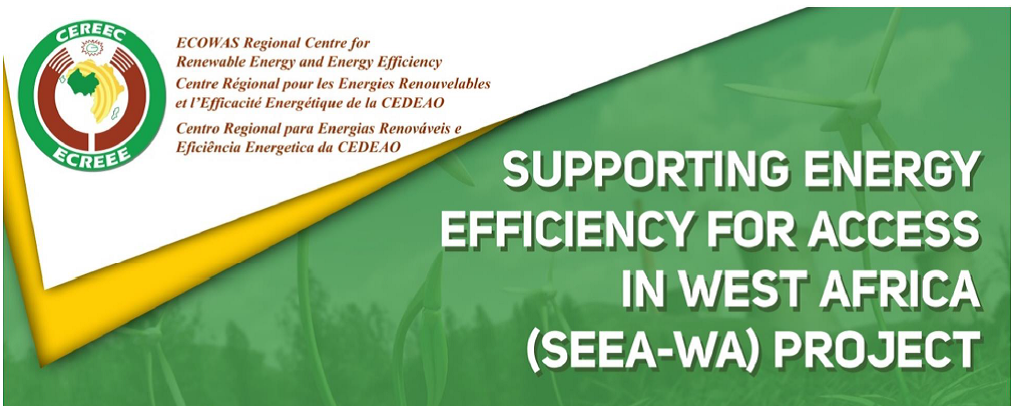Supporting Energy Efficiency Access in West Africa (SEEA-WA) Project funded by the European Union

The SEEA-WA project will contribute to access to energy services in West Africa, through a regional programme to improve energy efficiency. The project aims to overcome the technical, financial, legal, institutional, social, gender and capacity related barriers that hinder the implementation of cost effective energy efficiency (EE) measures and systems.
SEEA-WA will focus on the special interests and realities of poor women and men in urban and rural areas. Based within the ECOWAS Centre for Renewable Energy and Energy Efficiency (ECREEE), SEEA-WA will seek to combine improved energy efficiency with ongoing work on renewable energy sources, in order to broaden energy access.
It is paradoxical that while energy supply in West Africa is both insufficient and costly (people in West Africa pay more for unreliable energy supply than people in industrial countries) much of this energy is wasted or used inefficiently. To correct this situation, the project team will work with the public autho
rities of ECOWAS countries, with national competence centres and with the private sector, for instance home builders, stove makers, artisans or equipment m
anufacturers and vendors. SEEA-WA will carry out a three faceted approach to support West African countries. The total duration of
SEEA-WA implementation is forty (40) months.
SEEA-WA OBJECTIVES
The overall objective of SEEA-WA is to improve framework conditions for access to energy services, by supporting the creation of a regional programme on governance related to energy efficiency and access.
The specific objective is to:
- Develop the ECOWAS regional Energy Efficiency policy (ECOWAS EE White Paper).
- Raise the awareness of policy makers, regarding the commercial actors in the key energy value chains.
- Build capacity at the regional and national level to facilitate implementation of the key energy efficient technologies.
SEEA-WA DESCRIPTION
Framework conditions. SEEA-WA will support ECOWAS national authorities in creating a conducive regulatory and business environment to encourage women and men to adopt energy savings. Project team members will aid in choosing among the wide variety of possible policy tools (standards and labelling, regulations, educational tools, fiscal and tariff tools, special purpose EE financial tools, etc.) those that would be applicable and effective in the West African context.
Awareness raising. Many energy efficiency measures pay for themselves, through savings on energy bills. Capturing this potential for savings requires decisions by a myriad of individuals, organisations and businesses. The awareness raising aspect of SEEA-WA will reach out, on the one hand, to the commercial actors of the key energy value chains – the stove builders and charcoal producers, the electric appliance importers and sellers, the power utilities, the home builders – and on the other hand, to the women and men who use energy and make the decisions on purchasing (or producing themselves) the major energy using devices.
Technical implementation technologies. SEEA-WA will work with competence centres in West Africa to build capacity at the regional and national level in the implementation of the key energy efficient technologies. The project will encourage exchange of experience and the flow of information among energy practitioners in West Africa. Additionally, the project will organise focused training on the areas designated by national authorities, bringing in high level regional and international expertise.
Regional action on energy efficiency will benefit both the minority in West Africa who currently have access to modern energy but are faced with high prices and unreliable services, as well as the majority, for whom gaining access to affordable modern energy depends on reducing costs so as to make access programmes economically viable.
Main Activities
- Energy Efficiency stock taking, diagnosis in ECOWAS countries.
- Regional level institutional capacity building, knowledge sharing.
- National level institutional capacity building, knowledge sharing, institutional change.
- Development of ECOWAS EE White Paper.
- Formulating gender-sensitive energy efficiency policies and programmes.
- Content and visual identity.
- Carry out national campaigns focused on key intermediaries.
- Carry out regional and national media campaign focused on general public.
- Regional and national capacity building on technical issues.Regional and national financial tools.
- Technical exchange of experience.


